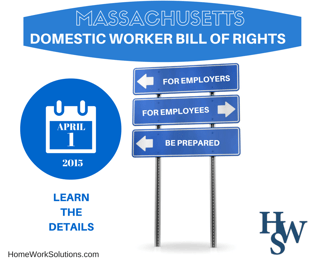 On April 1, 2015, Massachusetts will become the fourth state (after NY, CA and HI) to enact a Domestic Worker Bill of Rights (DWBR) that expands employment protections to domestic workers. All Massachusetts families who employ a nanny, senior caregiver, housekeeper or other “domestic service worker” will have new legal obligations. While many of the DWBR provisions simply reiterate that household employees are covered by existing state and federal law, the DWBR creates a number of new rights for household employees —and obligations for household employers. The DWBR specifies household employer —such recordkeeping and notice requirements, as well as limitations on when and how a live-in domestic worker may be terminated. The DWBR applies to all full time and part time household employees.
On April 1, 2015, Massachusetts will become the fourth state (after NY, CA and HI) to enact a Domestic Worker Bill of Rights (DWBR) that expands employment protections to domestic workers. All Massachusetts families who employ a nanny, senior caregiver, housekeeper or other “domestic service worker” will have new legal obligations. While many of the DWBR provisions simply reiterate that household employees are covered by existing state and federal law, the DWBR creates a number of new rights for household employees —and obligations for household employers. The DWBR specifies household employer —such recordkeeping and notice requirements, as well as limitations on when and how a live-in domestic worker may be terminated. The DWBR applies to all full time and part time household employees.
Who is Covered by the Massachusetts DWBR?
The DWBR applies to all families who employ a live in or live out, full time or part time domestic service worker. Domestic service workers includes nannies, senior caregivers, housekeepers, maids and other domestic workers who work in a private home and provide caregiving, housekeeping, household management, maid, and meal preparation services. . The law does not apply to any licensed or registered staffing, employment or placement agencies. "Domestic workers" are individuals who are paid to perform work of a domestic nature within a household, such as housekeeping, house cleaning, home management, nanny services, laundering, cooking, home companion services, and caretaking of individuals.
What new household employer obligations are created by the DWBR?
- Household employers must provide employees who work 16 hours a week or more a pay rate notice that includes:
(Update 4/1/2015 the MA attorney general published proposed regulations and sample forms for household employers to assist compliance with the DWBR.)
- Household employers must keep accurate and contemporaneous records of days and hours of work, and retain these records for a period of two years.
- Household employers must provide, when requested by the employee, a written performance evaluation after 3 months of employment, and annually thereafter. The employee has the right to dispute the written performance evaluation.
- Household employers must provide the live in household employee written notice of termination of employment – OR – the household employer must provide two weeks of severance pay. The employee will have the right to occupy their personal private space for a period of 30 days after termination, or be lodged in a comparable space at the employer’s expense. Employers who terminate a live in employee when they reasonably believe the employee has been abusive, neglectful, or engaged in harmful behavior are not subject to the notice or severance provisions.
What new rights and protections for household employees are created by the DWBR?
- Household employees are now specifically protected by existing statutes from unlawful harassment and retaliation for wage and hour complaints (complaints filed for unpaid wages and unpaid overtime.
- Household employees are now covered by the Massachusetts Maternity Leave Act and must be granted leaves of absence for childbirth or adoption.
- The DWBR confirms existing practice that household employees are covered under state unemployment and workers compensation statutes.
- The definition of working time is clarified to include all time the worker is required to be on the employer’s premises, including any time beyond the normally scheduled shift. Working time includes meal breaks when the household employee is not free to leave the employer’s premises and when not completely relieved of all duties. Household employees required to be on duty 24 or more consecutive hours must be paid for all time, including meal breaks and sleeping time, unless a prior written agreement is in place to exclude no more than 8 hours of sleep time in the 24 hour shift.
- Day of rest – household employees who work 40 or more hours in a week must be given at least 24 consecutive hours of “rest time” every calendar week, and at least 48 consecutive hours of “rest time” every calendar month. If the worker agrees in advance and in writing to work during this “rest time” the worker must be paid time-and-a-half for those hours.
- A household employee may request, and the household employer must provide, a written performance evaluation after 3 months of employment, and annually thereafter. The household employee has the right to inspect and dispute the written performance evaluation.
- Termination of a live in employee is strictly regulated. When the employer terminates the household employee without cause (typically because their needs change), the employee must receive written notice – OR – the household employer must provide two weeks of severance pay. The live in employee is entitled to remain in his or her private living space for a period of 30 days, or be lodged in a comparable living space at the employer’s expense for the same period.
How should household employers prepare for this new law?
Families with household workers do not have an HR department to turn to for guidance. The DWBR enables domestic workers to file lawsuits in court, so household employers who don't meet all of their obligations under the DWBR may face costly litigation penalties for violations.
Some time pre-planning by household employers is imperative to minimize the family's financial risks. Get your paperwork in order prior to the April 1, 2015 effective date. and consult with experienced employment counsel if they have any questions about how to comply with the law's requirements. Particular care should be taken in responding to allegations of harassment, and when terminating the employment of a live-in domestic worker. Employers should also look for guidance from the Massachusetts Attorney General's Office, which is expected before the law goes into effect and should help to clarify employers' obligations.
MA Mandatory Pay Rate Noice (Free Download)
Massachusetts Household Employers Guide

Go Ahead! Simplify with HomeWork Solutions!
HomeWork Solutions simplifies the "nanny taxes" and household payroll for thousands of families nationwide. We love talking with our clients and other families - for more than 20 years we have provided free telephone consultations.
800.626.4829
Call Us Today!

